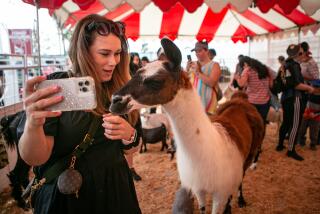It is the world’s largest county fair--in...
- Share via
It is the world’s largest county fair--in a county that plants more concrete than orchards these days.
Even when the citrus industry was prominent in Pomona, nothing shaped the community more than the Los Angeles County Fair.
The “Roaring” part of the ‘20s--the Jazz Age with flappers, gangsters, hip flasks and George Gershwin--was more the exception than the rule in peaceable, rustic Los Angeles County, where once a year parents spiffed up the kids in their Sunday best for a day of family fun at the fair.
It was a day to forget the chores, eat too many candy apples and have a good time.
Times have changed, but not that much.
The fair began in 1922, long before Nintendo and mega-malls, when the big Red Cars ran the city folk out to Pomona’s orchards and tent-covered fairgrounds, where judges exalted perfect pomegranate jelly and flawless patchwork quilts, and medicine men pitched mineral water and constipation cures.
*
Pomona was still a small citrus town of about 13,500--about a tenth of its population today--when some merchants got together in 1921 and held an exposition and carnival. The show proved so popular that the same group launched a grander version the following year.
The fair might never have gotten off the ground but for a newspaper reporter who wrote about the “impending” fair after overhearing a casual conversation.
Lloyd Hamilton, a reporter for The Bulletin (now the Inland Valley Daily Bulletin), overheard two Lions Club members discussing a county fair to replace the merchants’ show.
Hamilton, not exactly using the two-source Watergate Rule that is commonplace today, helped to make history by writing up the story about the fair he believed was coming.
A Chamber of Commerce member read the story, asked a Lions Club member to present the plans to the City Council and soon the fair board was organized. Pomona Councilman C. B. (Jack) Afflerbaugh became the fair’s first paid manager, a post he held until 1960, when he died at age 72.
Right off the bat, he championed the purchase in 1922 of a 43-acre beet and barley field from the original rancho of wealthy Mexican cattleman Ricardo Vejar for use as a fairground. The following year, an additional 62 acres were purchased and deeded over to the county.
Afflerbaugh, a local pharmacist whose sales pitch could supposedly “talk the Works Progress Administration out of its gold teeth,” according to his obituary in The Times in 1960. He was also the creator of the floats that Pomona entered in the Rose Parade every year. But his flair for dressing never quite matched his flair for design: In an era when men were considered virtually naked without a hat and suit coat, Afflerbaugh always griped when he had to don a cumbersome suit, and he stuck doggedly to casual wear.
He wasn’t the type to sit behind a desk either; he could always be found repairing horse stalls, digging up flower beds, wielding a paintbrush or pouring concrete.
In 1933, parimutuel wagering was legalized in California and the fair became the first in the country to offer betting on horse races. The track, which still stands, was built on the spot where Vejar had raced thoroughbreds more than a century ago.
For six years, World War II brought a halt to the fair. The parking lots became a collection center for Japanese-American detainees who were taken to a relocation camp in Wyoming, and temporary housing was installed for Army troops.
Today, wine judges sip the best of the fair at the 487-acre complex along the northern edge of Pomona, at the eastern edge of the county.
The Fairplex hosts not just the fair but a variety of special events and consumer shows year-round.
This year’s fair, with the theme of “Good Time Jamboree,” opened Friday and will run through Oct. 3.
Fair-goers will find the admission and carnival-ride prices lower than last year. Admission is $8 for adults and $4 for children. Prices on carnival rides will be capped at $1.50.
More to Read
Sign up for Essential California
The most important California stories and recommendations in your inbox every morning.
You may occasionally receive promotional content from the Los Angeles Times.













